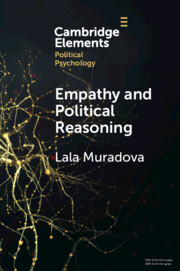107 results

Empathy and Political Reasoning
- How Empathy Promotes Reflection and Strengthens Democracy
-
- Published online:
- 04 March 2025
- Print publication:
- 13 March 2025
-
- Element
-
- You have access
- HTML
- Export citation
Practical Deliberation is Normative
-
- Journal:
- Journal of the American Philosophical Association , First View
- Published online by Cambridge University Press:
- 09 January 2025, pp. 1-16
-
- Article
-
- You have access
- Open access
- HTML
- Export citation
Précis of Open and Inclusive: Fair Processes for Financing Universal Health Coverage
-
- Journal:
- Health Economics, Policy and Law , First View
- Published online by Cambridge University Press:
- 07 January 2025, pp. 1-5
-
- Article
-
- You have access
- Open access
- HTML
- Export citation
Duty and Deontology
-
- Journal:
- Canadian Journal of Philosophy / Volume 53 / Issue 4 / May 2023
- Published online by Cambridge University Press:
- 11 September 2024, pp. 289-300
-
- Article
-
- You have access
- Open access
- HTML
- Export citation
10 - American Pragmatism, Democratic Ethics, and Education
- from Part I - Traditions in Ethics and Education
-
-
- Book:
- The Cambridge Handbook of Ethics and Education
- Published online:
- 07 March 2024
- Print publication:
- 14 March 2024, pp 186-212
-
- Chapter
- Export citation
The Good and the Wrong of Hypocritical Blaming
-
- Article
-
- You have access
- Open access
- HTML
- Export citation
Chapter 9 - The Philosophy of Science in Either/Or
-
-
- Book:
- Kierkegaard's <i>Either/Or</i>
- Published online:
- 16 November 2023
- Print publication:
- 30 November 2023, pp 153-170
-
- Chapter
- Export citation
Leibniz's Moral Psychology of an Evil Person
-
- Journal:
- Dialogue: Canadian Philosophical Review / Revue canadienne de philosophie , First View
- Published online by Cambridge University Press:
- 17 November 2023, pp. 1-23
-
- Article
- Export citation
5 - Ethics
-
- Book:
- Frontline Crisis Response
- Published online:
- 28 September 2023
- Print publication:
- 12 October 2023, pp 66-82
-
- Chapter
- Export citation
3 - Two Kinds of Agreement in Democratic Theory
-
- Book:
- Stanley Cavell's Democratic Perfectionism
- Published online:
- 17 August 2023
- Print publication:
- 31 August 2023, pp 98-131
-
- Chapter
- Export citation
5 - Cicero’s De Officiis on Practical Deliberation
- from Part II - The Role of Virtue
-
-
- Book:
- Cicero's ‘De Officiis'
- Published online:
- 15 June 2023
- Print publication:
- 29 June 2023, pp 97-116
-
- Chapter
- Export citation
Chapter 12 - Pragmatist Moral Education
- from Part II - New Approaches to Moral Education
-
-
- Book:
- Moral Education in the 21st Century
- Published online:
- 01 June 2023
- Print publication:
- 15 June 2023, pp 210-228
-
- Chapter
- Export citation
Chapter 8 - The Capability Approach as a Foundation for Moral Education
- from Part II - New Approaches to Moral Education
-
-
- Book:
- Moral Education in the 21st Century
- Published online:
- 01 June 2023
- Print publication:
- 15 June 2023, pp 136-150
-
- Chapter
- Export citation
9 - Influencing the Conversation
-
- Book:
- Decisions for Sustainability
- Published online:
- 25 May 2023
- Print publication:
- 08 June 2023, pp 146-164
-
- Chapter
- Export citation

Decisions for Sustainability
- Facts and Values
-
- Published online:
- 25 May 2023
- Print publication:
- 08 June 2023
Chapter 4 - Aristotle’s Defence of Natural Teleology
-
- Book:
- True Purposes in Hegel's Logic
- Published online:
- 16 May 2023
- Print publication:
- 27 April 2023, pp 60-78
-
- Chapter
- Export citation
18 - Debate and Deliberation in Democratic Education
- from Part Three - Key Topics and Concepts
-
-
- Book:
- The Cambridge Handbook of Democratic Education
- Published online:
- 20 April 2023
- Print publication:
- 27 April 2023, pp 298-310
-
- Chapter
- Export citation
14 - Democratic Deliberation in the Absence of Integration
- from Part Two - Philosophical and Normative Foundations
-
-
- Book:
- The Cambridge Handbook of Democratic Education
- Published online:
- 20 April 2023
- Print publication:
- 27 April 2023, pp 230-249
-
- Chapter
- Export citation
Chapter 4 - Debating the Two-Chamber System
-
- Book:
- Hegel and the Representative Constitution
- Published online:
- 13 April 2023
- Print publication:
- 20 April 2023, pp 129-166
-
- Chapter
- Export citation
The Moral Permissibility of Digital Nudging in the Workplace: Reconciling Justification and Legitimation
-
- Journal:
- Business Ethics Quarterly / Volume 33 / Issue 3 / July 2023
- Published online by Cambridge University Press:
- 14 April 2023, pp. 502-531
- Print publication:
- July 2023
-
- Article
-
- You have access
- Open access
- HTML
- Export citation

